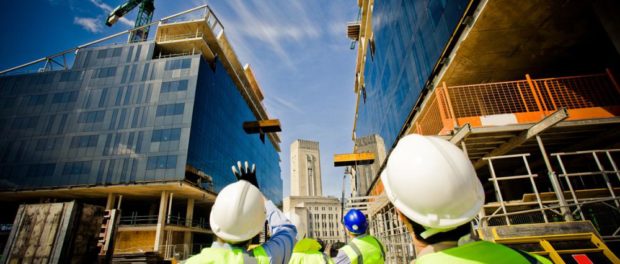Construction industry sees loss of momentum, PMI survey says

Activity in the construction industry fell again in July, confirming “a clear loss of momentum since the second quarter of 2016”, a survey has said.
The Markit/CIPS purchasing managers’ index (PMI) for the sector fell to 45.9 last month, down slightly from June and below 50, which indicates contraction.
The latest number suggests output in the construction industry shrank at the fastest pace since June 2009.
The Brexit vote was the main factor weighing on activity, the report said.
It follows Monday’s survey indicating a sharp downturn in factory activity. On Wednesday, the PMI survey for the services industry will be released.
The surveys are based on replies to questionnaires sent to purchasing executives and they are seen as one of the earliest indicators of the economy’s performance.
‘Risk aversion’
“Anecdotal evidence suggested that economic uncertainty following the EU referendum was the main factor weighing on business activity in July, especially in the commercial building sector,” the report said.
However, it added that there were also reports that suggested demand patterns had been more resilient than expected.
“UK construction firms frequently cited ongoing economic uncertainty as having a material negative impact on their order books,” said Tim Moore, author of the report.
“In particular, survey respondents noted heightened risk aversion and lower investment spending among clients, notwithstanding a greater number of speculative enquiries in anticipation of lower charges.”
He added that construction firms generally suggested that clients adopted a wait-and-see approach rather than curtailing or cancelling forthcoming projects during July.
‘Weaker demand’
Meanwhile, building suppliers firm Travis Perkins has warned that the EU referendum has created “significant uncertainty” in the outlook for its business.
It saw “weaker demand” in the run up to the 23 June referendum and immediately afterwards, the company said in its half-year earnings statement.
“In our view it is too early to precisely predict end-market demand and we will continue to monitor the lead indicators we track and will react accordingly,” it added.industry accounts for about 6% of the UK economy
Samuel Tombs from Pantheon Economics said that given the Brexit negotiations were likely to be protracted, businesses will remain “reluctant to commit to major capital expenditure for a long time to come”.
“Meanwhile, the public investment plans won’t be reviewed until the Autumn Statement at the end of the year and most major construction projects have long lead times. So it’s hard to see the construction sector escaping its recession within the next year.”
However, in contrast to the PMI survey, the Mineral Products Association, which represents companies that make products such as asphalt and cement, said its figures pointed to an uptick in activity in the construction industry.
Sales in ready-mix cement, for example, which is delivered direct to a construction site, are up 3.3% in the second quarter compared with the first, and up 6.5% compared with last year.
A spokesperson said they were “scratching their heads” to explain the discrepancy.
The Bank of England meets on Thursday and is widely expected to cut rates to help the economy in the wake of the referendum vote.
